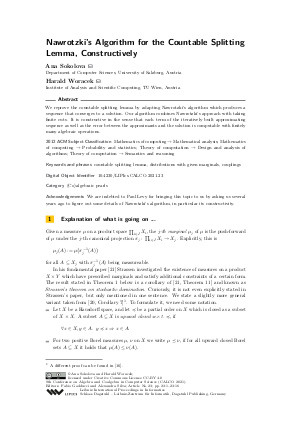Nawrotzki’s Algorithm for the Countable Splitting Lemma, Constructively ((Co)algebraic pearls)
Authors Ana Sokolova, Harald Woracek
-
Part of:
Volume:
9th Conference on Algebra and Coalgebra in Computer Science (CALCO 2021)
Part of: Series: Leibniz International Proceedings in Informatics (LIPIcs)
Part of: Conference: Conference on Algebra and Coalgebra in Computer Science (CALCO) - License:
 Creative Commons Attribution 4.0 International license
Creative Commons Attribution 4.0 International license
- Publication Date: 2021-11-08
File

PDF
LIPIcs.CALCO.2021.23.pdf
- Filesize: 0.64 MB
- 16 pages
Document Identifiers
Subject Classification
ACM Subject Classification
- Mathematics of computing → Mathematical analysis
- Mathematics of computing → Probability and statistics
- Theory of computation → Design and analysis of algorithms
- Theory of computation → Semantics and reasoning
Keywords
- countable splitting lemma
- distributions with given marginals
- couplings
Metrics
- Access Statistics
-
Total Accesses (updated on a weekly basis)
0Document
0Metadata
Abstract
We reprove the countable splitting lemma by adapting Nawrotzki’s algorithm which produces a sequence that converges to a solution. Our algorithm combines Nawrotzki’s approach with taking finite cuts. It is constructive in the sense that each term of the iteratively built approximating sequence as well as the error between the approximants and the solution is computable with finitely many algebraic operations.
Cite As Get BibTex
Ana Sokolova and Harald Woracek. Nawrotzki’s Algorithm for the Countable Splitting Lemma, Constructively ((Co)algebraic pearls). In 9th Conference on Algebra and Coalgebra in Computer Science (CALCO 2021). Leibniz International Proceedings in Informatics (LIPIcs), Volume 211, pp. 23:1-23:16, Schloss Dagstuhl – Leibniz-Zentrum für Informatik (2021)
https://doi.org/10.4230/LIPIcs.CALCO.2021.23
BibTex
@InProceedings{sokolova_et_al:LIPIcs.CALCO.2021.23,
author = {Sokolova, Ana and Woracek, Harald},
title = {{Nawrotzki’s Algorithm for the Countable Splitting Lemma, Constructively}},
booktitle = {9th Conference on Algebra and Coalgebra in Computer Science (CALCO 2021)},
pages = {23:1--23:16},
series = {Leibniz International Proceedings in Informatics (LIPIcs)},
ISBN = {978-3-95977-212-9},
ISSN = {1868-8969},
year = {2021},
volume = {211},
editor = {Gadducci, Fabio and Silva, Alexandra},
publisher = {Schloss Dagstuhl -- Leibniz-Zentrum f{\"u}r Informatik},
address = {Dagstuhl, Germany},
URL = {https://drops.dagstuhl.de/entities/document/10.4230/LIPIcs.CALCO.2021.23},
URN = {urn:nbn:de:0030-drops-153781},
doi = {10.4230/LIPIcs.CALCO.2021.23},
annote = {Keywords: countable splitting lemma, distributions with given marginals, couplings}
}
Author Details
Acknowledgements
We are indebted to Paul Levy for bringing this topic to us by asking us several years ago to figure out some details of Nawrotzki’s algorithm, in particular its constructivity.
References
- G. Barthe, T. Espitau, J. Hsu, T. Sato, and P.-Y. Strub. *-liftings for differential privacy. In Ioannis Chatzigiannakis, Piotr Indyk, Fabian Kuhn, and Anca Muscholl, editors, 44th International Colloquium on Automata, Languages, and Programming, ICALP 2017, July 10-14, 2017, Warsaw, Poland, volume 80 of LIPIcs, pages 102:1-102:12. Schloss Dagstuhl - Leibniz-Zentrum für Informatik, 2017. URL: https://doi.org/10.4230/LIPIcs.ICALP.2017.102.
- G. Barthe, T. Espitau, J. Hsu, T. Sato, and P.-Y. Strub. Relational ⋆⋆backslashstar-liftings for differential privacy. Log. Methods Comput. Sci., 15(4), 2019. URL: https://doi.org/10.23638/LMCS-15(4:18)2019.
- G. Barthe, M. Gaboardi, B. Grégoire, J. Hsu, and P.-Y. Strub. Proving differential privacy via probabilistic couplings. In Martin Grohe, Eric Koskinen, and Natarajan Shankar, editors, Proceedings of the 31st Annual ACM/IEEE Symposium on Logic in Computer Science, LICS '16, New York, NY, USA, July 5-8, 2016, pages 749-758. ACM, 2016. URL: https://doi.org/10.1145/2933575.2934554.
- M. Beiglböck and N. Juillet. On a problem of optimal transport under marginal martingale constraints. Ann. Probab., 44(1):42-106, 2016. URL: https://doi.org/10.1214/14-AOP966.
- P. Berti, L. Pratelli, P. Rigo, and F. Spizzichino. Equivalent or absolutely continuous probability measures with given marginals. Depend. Model., 3(1):47-58, 2015. URL: https://doi.org/10.1515/demo-2015-0004.
- E. D'Aniello and J.D.M. Wright. Finding measures with given marginals. Q. J. Math., 51(4):405-416, 2000. URL: https://doi.org/10.1093/qjmath/51.4.405.
- M.H.A. Davis and D.G. Hobson. The range of traded option prices. Math. Finance, 17(1):1-14, 2007. URL: https://doi.org/10.1111/j.1467-9965.2007.00291.x.
- S. Friedland, J. Ge, and L. Zhi. Quantum Strassen’s theorem. Infin. Dimens. Anal. Quantum Probab. Relat. Top., 23(3):2050020, 29, 2020. URL: https://doi.org/10.1142/S0219025720500204.
-
N. Gaffke and L. Rüschendorf. On the existence of probability measures with given marginals. Statist. Decisions, 2(1-2):163-174, 1984.

- J. Hsu. Probabilistic couplings for probabilistic reasoning. Phd thesis, University of Pennsylvania, 2017. URL: https://repository.upenn.edu/edissertations/3017/.
-
C. Jones. Probabilistic Non-determinism. Phd thesis, University of Edinburgh, 1989.

-
A. Jung and R. Tix. The troublesome probabilistic powerdomain. In Third Workshop on Computation and Approximation (Comprox III) (Birmingham, 1997), volume 13 of Electron. Notes Theor. Comput. Sci., page 22. Elsevier Sci. B. V., Amsterdam, 1998.

- T. Kamae, U. Krengel, and G.L. O'Brien. Stochastic inequalities on partially ordered spaces. Ann. Probability, 5(6):899-912, 1977. URL: https://doi.org/10.1214/aop/1176995659.
- J. Kawabe. A type of Strassen’s theorem for positive vector measures with values in dual spaces. Proc. Amer. Math. Soc., 128(11):3291-3300, 2000. URL: https://doi.org/10.1090/S0002-9939-00-05384-3.
- H.G. Kellerer. Funktionen auf Produkträumen mit vorgegebenen Marginal-Funktionen. Math. Ann., 144:323-344, 1961. URL: https://doi.org/10.1007/BF01470505.
- H.G. Kellerer. Duality theorems for marginal problems. Z. Wahrsch. Verw. Gebiete, 67(4):399-432, 1984. URL: https://doi.org/10.1007/BF00532047.
- H. König. On the marginals of probability contents on lattices. Mathematika, 58(2):319-323, 2012. URL: https://doi.org/10.1112/S0025579311002427.
- V.T. Koperberg. Couplings and matchings. Bachelor thesis, Universiteit Leiden, 2016. URL: https://www.universiteitleiden.nl/binaries/content/assets/science/mi/scripties/koperbergbach.pdf.
- K. Nawrotzki. Eine Monotonieeigenschaft zufälliger Punktfolgen. Math. Nachr., 24:193-200, 1962. URL: https://doi.org/10.1002/mana.19620240305.
- H.J. Skala. The existence of probability measures with given marginals. Ann. Probab., 21(1):136-142, 1993. URL: http://links.jstor.org/sici?sici=0091-1798(199301)21:1<136:TEOPMW>2.0.CO;2-I&origin=MSN.
- V. Strassen. The existence of probability measures with given marginals. Ann. Math. Statist., 36:423-439, 1965. URL: https://doi.org/10.1214/aoms/1177700153.
